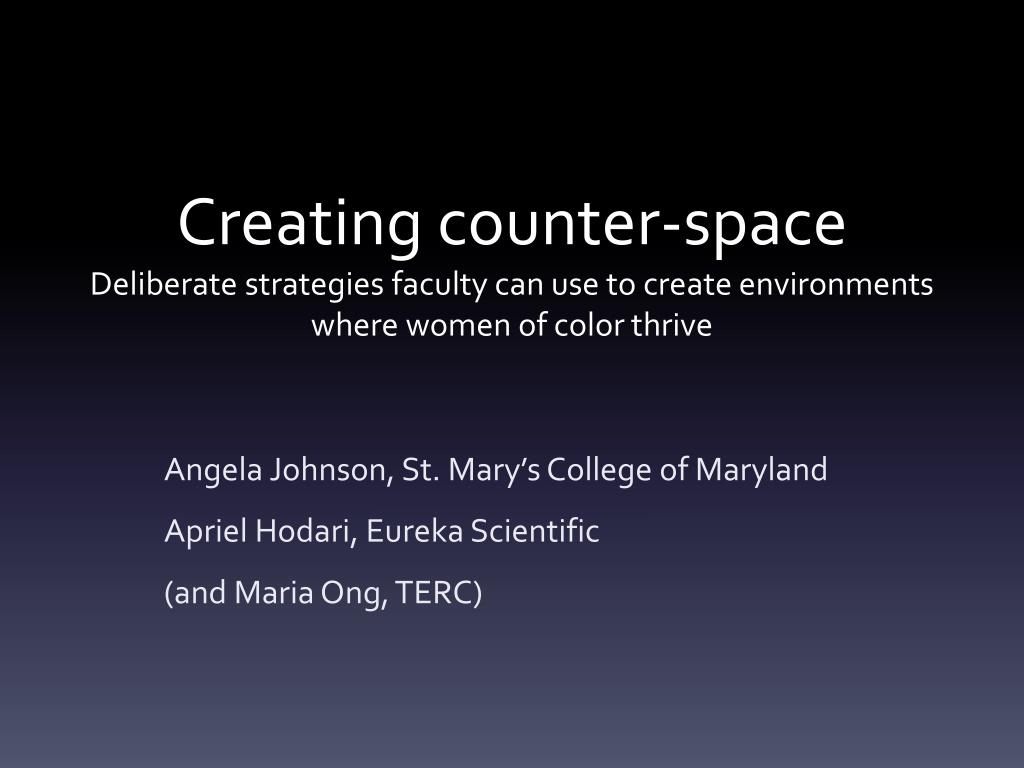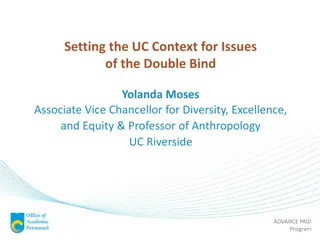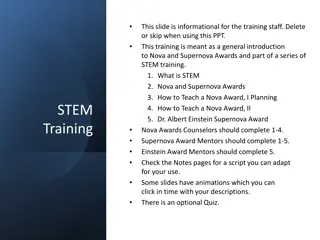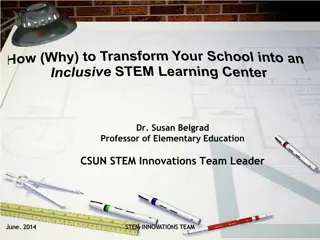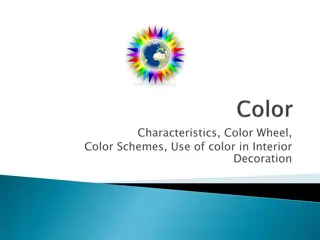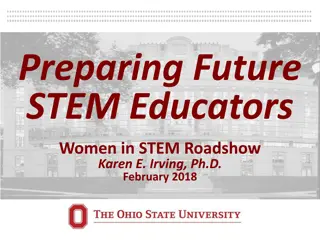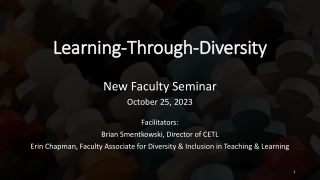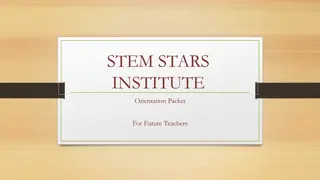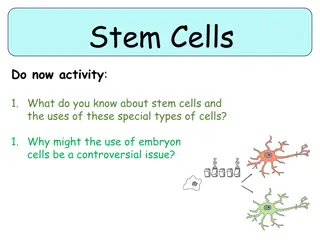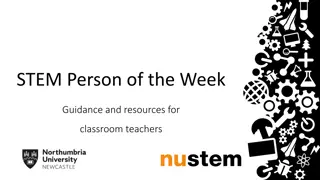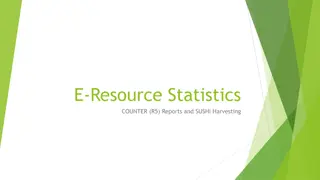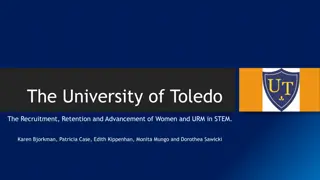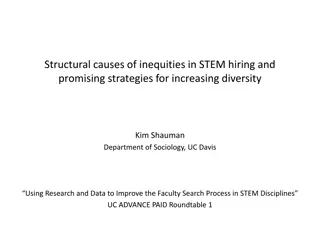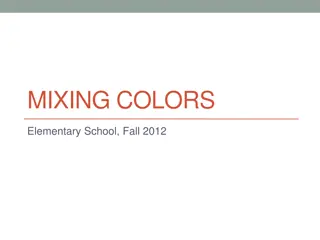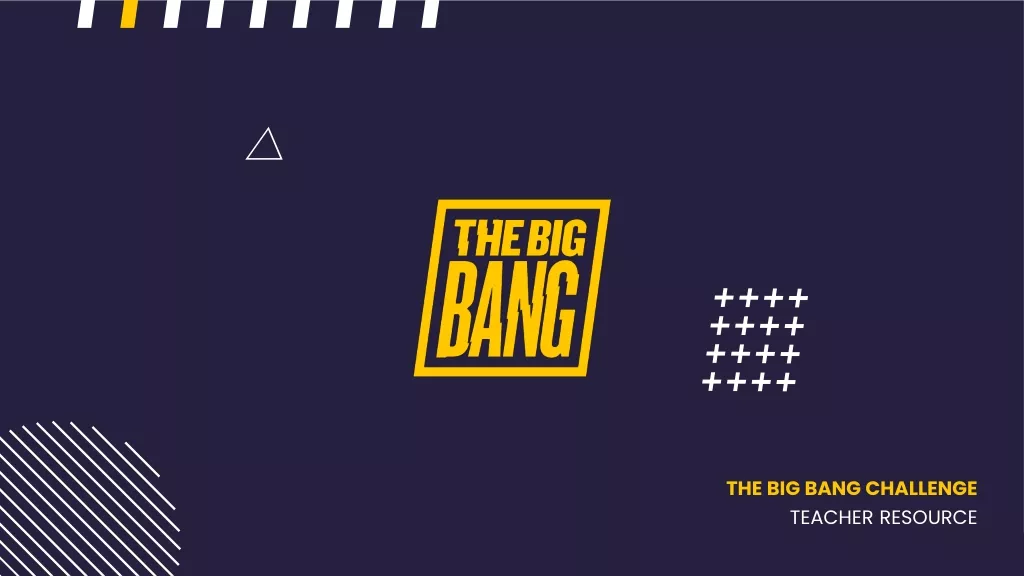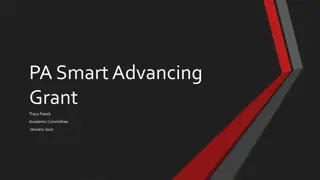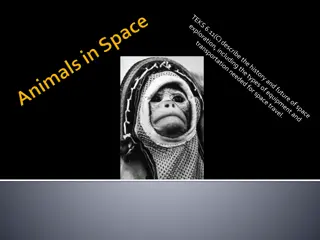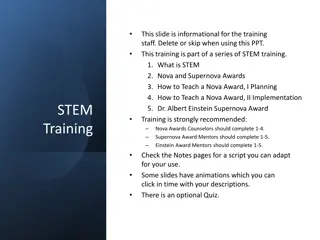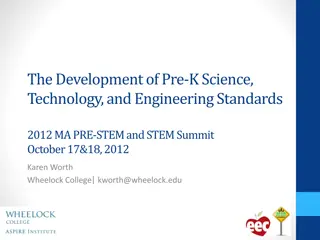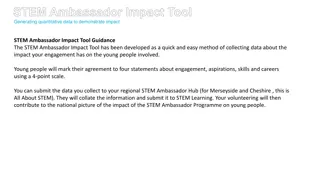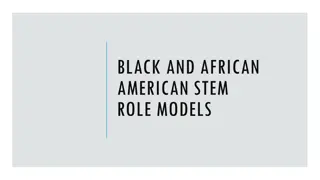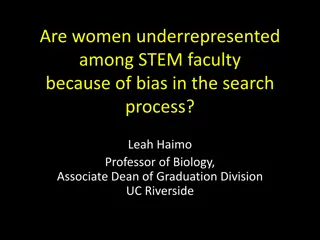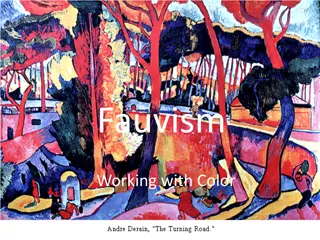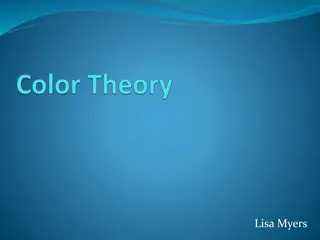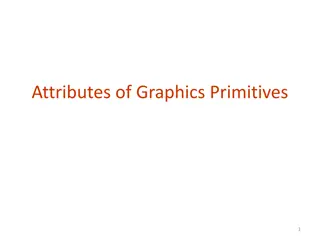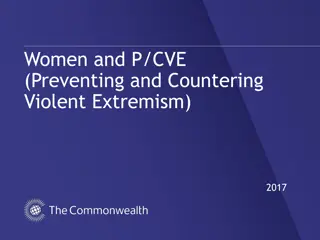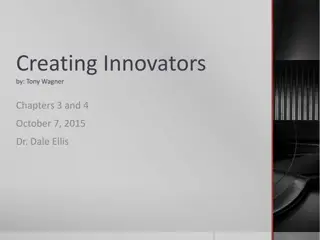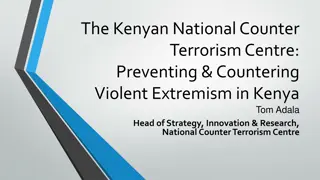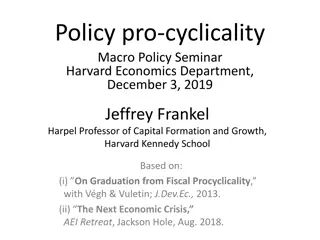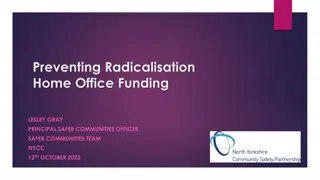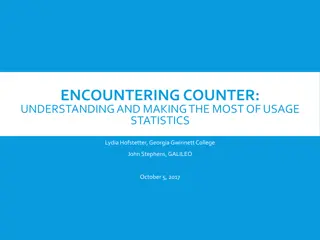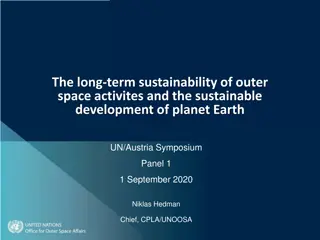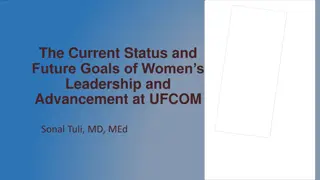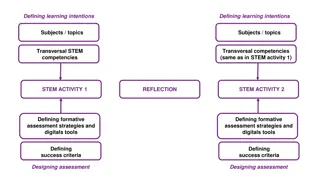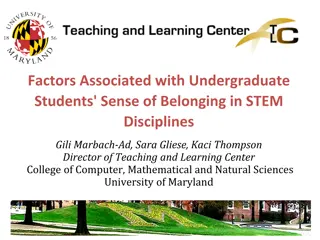Creating Counter Space: Strategies for Women of Color in STEM
Delve into deliberate strategies that faculty can implement to cultivate environments where women of color thrive in STEM fields like physics, astronomy, computer science, and engineering. Explore research findings, statistics, and initiatives aimed at addressing challenges faced by women of color in STEM education and professions.
Download Presentation

Please find below an Image/Link to download the presentation.
The content on the website is provided AS IS for your information and personal use only. It may not be sold, licensed, or shared on other websites without obtaining consent from the author. Download presentation by click this link. If you encounter any issues during the download, it is possible that the publisher has removed the file from their server.
E N D
Presentation Transcript
Creating counter-space Deliberate strategies faculty can use to create environments where women of color thrive Angela Johnson, St. Mary s College of Maryland Apriel Hodari, Eureka Scientific (and Maria Ong, TERC)
Citation info for this presentation Johnson, A., Hodari, A., & Ong, M. (2016). Creating counter-space: Deliberate strategies faculty can use to create environments where women of color thrive. Paper presented at the American Association of Physics Teachers Summer Meeting, Sacramento, California.
The plan Look at some stats Talk about our studies Describe the problem: Typical experiences of women of color in physics Describe faculty actions that redress these
Women of color in physics Bachelor s: Percent of women nationwide, 2002-2012 60 50 American Indian women 40 Other/unknown ethnicity, women 30 Latinas 20 Black women 10 Asian women 0 White women US citizens & residents Physics Computer science Engineering
Beyond the Double Bind Goal: To discover the strategies that enabled women of color (Asian American, Black, Latina, Native American, and mixed-race women) to achieve higher levels of advancement in STEM education and professions (specifically: physics, astronomy, computer science, engineering) Co-Pis: AprielHodari, Eureka Scientific; Maria Ong, TERC
Beyond the Double Bind NSF-funded research projects: Beyond the Double Bind Computing Beyond the Double Bind Engineering Beyond the Double Bind Qualitative interviews with 43 women of color, of varying racial/ethnic groups, career stages (students & professionals), and the four STEM disciplines we studied. 20 were students, but all provided information on academic experiences. Narrative inquiry and analysis Mix of inductive and deductive coding methods
My study Goal 1: to find out what it s like to be a woman studying physics, math and computer science in departments where lots of women major in those fields Goal 2: With a special focus on women of color
My study Ethnography Physics, math and computer science departments (at one school) where 37% of grads are women. National average: 28% Liberal arts average: 31%, st dev 5% 12 interviews with faculty 19 interviews with students (over-sampling women of color) 3 class-wide focus groups 24 classes attended Grounded theory--looking at the culture of the departments
Being a woman of color in physics Persisting women of color often reported Isolation Microaggressions Finding support in counter-spaces
Isolation It s the little things that get you, like walking into a classroom and seeing no one there but Whites and Asians. Maybe this isn t where I m supposed to be at. Or you walk in and it s all men, there s one female. What s wrong with her? It s really subliminal, and it s not something I think the University does, but the experience is the same. There s this real message that you re not supposed to be here. Like, I get a serious message saying, You re not supposed to be in physics . (Black physics major)
Isolation I just remember at times, taking exams [in upper division, where I was the only minority woman] and looking up and looking at everyone and just being so convinced that everyone just looks smarter than me . They just look smarter. And it s such a hard thing to get out of your head. And I ll sit there and I ll think, No, it s not true. But [it s hard] to really change the way you feel. And, you know, even today I still kind of feel that way. It s like I look up, because, you know, you never see someone that looks like me as a scientist. (Latina physics major)
Microaggressions Subtle indignities, slights, or insults directed toward women and/or people of color, consciously or unconsciously (Sol rzano 2000, Sue & Sue 2007) Competence in STEM questioned
Microaggressions I was both the only girl and the only undergrad in the entire lab . I was working with this one volatile chemical to try and density match things, and another person walked into the lab and bumped me while I was pipetting the liquid, and it spilled onto the lab table. I moved one of the hoods over it and someone else walked into the lab, commented on the fact that it smelled, and my mentor laughed and said can you guess who spilled it? and they all looked at me, and they all started laughing, and I was the only girl in the lab at that point, and they all continued to laugh, and I just kind of stood there awkwardly, and the grad student said how does it feel to have the boys club laughing at you? (Black physics major)
Microaggressions I just packed my things up and left that day. [For the rest of the summer] I didn t speak except when spoken to. I was too afraid to reinforce their idea that I was incapable and didn t belong there. I was afraid of making the necessary mistakes to succeed.
Microaggressions I communicated that it was a tradition on both sides of my family to honor surviving slavery, and that I thought that was really important for my [future] children that I wanted them to know that they come from a background of people who have survived very difficult things and that makes them very strong. And at some point, one of the [White] guys jumps in and says, You know, you Black people are always complaining about slavery. And you should just get over it. It happened a long time ago and it doesn t affect you anymore. And you Black people won t shut up about it.
The Sewer Pipe Everyone calls it a pipeline problem. But what they don t realize is it s a sewer pipe. Nobody wants to go in there, it s full of shit. You go in, and you want to get out as fast as you can and when you come out, even if you come out [on] the sidewalk, you smell like shit. Why would anyone want to go in this sewer pipe, right? (Black Professional in astronomy)
Finding counter-space Critical safe places existing at the edges of STEM to serve marginalized groups Validate each other as academic scholars Vent frustrations about racism and sexism Allow academic identities to develop alongside positive racial climates Source: Sol rzano 2000
Counterspaces Peer-to-peer relationships Mentoring relationships Campus student groups and STEM enrichment programs STEM diversity conferences STEM departments
Departments as counter-spaces The instructors, program directors, teaching assistants, all of them, have always been really rooting for me. And that really means a lot. And I think support is probably the single most important thing that you need to get through this place...is someone to say, We really believe in you ... It really makes you rise to the occasion. (Black physics major)
Departments as counter-spaces I feel like I m pretty good at physics--it s been comfortable for me thus far. I can t really think of anything I don t like . I feel like I ve been pretty supported in this department. The teachers...have all been great, and very helpful. (Black physics major)
Friendship and support I ve gotten to know a few people, I ve definitely made friends through group work...a lot of my friends were computer science majors (African American senior) I can imagine how at bigger schools it can be more difficult. At smaller schools, since there s so few people, you get to know everybody, and at [this school] everybody is so friendly. (African American junior)
Friendship and support I guess it can be intimidating at first, to go into a field where there are far more men. But it becomes...they just become like your friends. It s not like you have to see a huge difference because I m a girl and that s a guy. (Latina physics major)
Friendship and support I ve gotten so close with [professors]. They kind of seem like second parents to me. [Another professor], if you have problems in class, he makes an effort to try and help as best he can. I think that s really the theme of the professors in the computer science department-they try to help you out as best they can. (African American senior)
Trust in professors: microaggressions In particular, students trust professors to deal with microaggressions: [After recounting a story about being isolated and humiliated by a mentor in a summer research experience at another institution] I m sure if I said something to [my department chair], he would pull that person aside and have a conversation with him. (African American senior)
Trust in professors: microaggressions The other day [in a computer science class], some people were making dumb jokes about the type of crypto currency you can use-- like bit coin. One of the main industries that develops crypto-currency is adult entertainment, one group in the corner was talking about different names of crypto-currency. One of them was like tit coin, and they kept saying that and talking about it. After it simmered down, [the male professor] said and people wonder why women are discouraged in computer science. That was nice. (White senior)
What are faculty doing? Faculty in all three majors deliberately built this climate over at least 15 years.
Teach well I like that the classes aren t lectures. Most of the teachers will lecture for a half hour, 45 minutes, and then at some point in there ends up being some partner work or someone goes up to the board and works through a problem . It s more a conversation with everybody in the class and the professor than the information being thrown at you.
Teach well Emphasizing relevance and connections Constantly monitoring student learning (problems at the board; clickers; in class work; randomly calling on students) Flipped classrooms Careful group work (letting students specify who they DON T want to work with; using CATME software to build groups) Growth mindsets ( I always emphasize practice. Practice is how you learn! assistant professor)
Growth mindset Math is about hard work. It s not about intelligence. So I really don t accept I just don t get math. If you spend time on it, you will get it. That s something that gets easier as you practice. A student puts up an answer on the board, says I think I need to change it, and the professor says you re allowed to modify!
Create community We try to create community through activities, and also I try to create it with teamwork. People get to know each other, and hopefully form study groups and so forth . We know these things are good for students, and we re proactive about it. (professor)
Create community Math: Pi day, math club, Putnam exam (with pep rally and emphasis on the median score being 0), Math Girls Day (with local middle schoolers), SIAM, AWM Physics: Alumni day, student research presentations, local AAPT chapter meeting, CUWiP, Facebook page CS: Women in CS tea, Grace Hopper Women in Science House
Value a broad range of students You don t have to go to grad school to be a physics major. There are many other things you can do, and we re excited about them, they re cool jobs. (assistant professor) We want everyone to be good physics students, but we don t have to all be great physics students. They have to be successful at acquiring various useful skills, they re not all going to be physicists, and we want them to be productive and happy. (associate professor)
Support URM students While I was in the program it was a low-stakes thing, it was helpful for me to get used to talking about the problem, sometimes being wrong, but it was ok, we were all just thinking about it. There was no pressure to get it right the first time. And we got to work on more challenging problems, so if I could learn how to do those more challenging problems, I knew I could do the other, easier problems [required in class]. (Latina physics major) Some advice I would give to people in the computer science department would be to actually get to know other people. I see it in ESP happening a lot--the students that I TA now, they re all good friends from the get-go. It s really nice to see a more sociable side of computer science majors--not just the stereotype of the CS majors just like working alone on their own computers. It s nice to see people interacting with each other and wanting to do group projects together. (Black computer science major)
Make careful hires Changing the focus of the department would not have been possible without the change in faculty as well. (professor) Candidates give both research and teaching talks (on intentionally boring topics) Job ads state expectation of demonstrated success and interest in attracting and retaining students from under-represented groups (professor) Help in initial negotiations
Advocate for women faculty Almost 40% of faculty in physics, math and CS are women In other environments, I would ignore that I was the only other woman in the room no-one else was acknowledging it I would have to flip that part of my brain on and run it in the background. Here, because someone else s got this, I can just do [discipline] .We re all handling this together, nobody has to handle this themselves. (assistant professor)
No criticism zone As a departmental faculty, we ve decided that we will not say negative critical things about students where students can hear not just the student in question, but any students. Because we don t want a student to go back and say well geez, if they re willing to say that about so and so, what are they saying about me? We tell the TAs about it and explain it . It doesn t mean you can t be grumpy about students, it means that if you re going to go do it you close the door and make sure you re not in a public space, including Target or something. (associate professor) I really feel like that mentality in many ways may be the biggest single factor in terms of our growth, just in terms of numbers our popularity on campus. (professor)
Control their biases [What does it mean for someone to be a good physics student?] I don t know! I would have given you a very different answer when I started my career. The answer back then is someone who s a lot like me does really well in his or her physics classes, goes on to get a PhD in grad school . Right now I m not sure I know the answer. This may sound weird, but I m not sure I really want to have in my mind a vision of what I would consider to be a good physics student, because any concrete model I have in my mind, a person I consider to be a good physics student, is going to be exclusionary. (professor)
Control their biases Between the three of us [all the professors in the department], we do a pretty good job of calling out instances of sexism, racism, that occur naturally because computer science is a boys club right now, despite our best efforts of changing that. (associate professor) I think we all acknowledge that life isn t the same in mathematics for women as it is for men both as a teacher and a researcher and so we always have this in our minds when we re thinking about issues of classroom dynamics, issues of mathematical methodologies or educational methodologies, and how well, this really works well for me is a pointless statement. (professor)
The outtake reels Slides I wanted to include that just really didn t fit
Women of color in STEM Bachelor s: Percent of women nationwide, 2002-2012 70 60 50 40 American Indian Other/unknown 30 Asian 20 Hispanic/Latino 10 Black 0 White
Qualitative research Explores questions we don t know the answers to Open-ended questions Careful follow-up questions Member checking
Isolation [Being Latina] affected me because there s no Latinas, or, if there are any, I don t know them. So, in that sense, it s you know, Oh, what s wrong with us, are we dumb? (senior physics major)
Microaggressions I communicated that it was a tradition on both sides of my family to honor surviving slavery, and that I thought that was really important for my [future] children that I wanted them to know that they come from a background of people who have survived very difficult things and that makes them very strong. And at some point, one of the [White] guys jumps in and says, You know, you Black people are always complaining about slavery. And you should just get over it. It happened a long time ago and it doesn t affect you anymore. And you Black people won t shut up about it.
Reduce competition We try really hard not to have the competitive model of the major. My sense is that having a competitive model is one of the things that tends to make it less attractive to women. Mind you, this is another one of those things that I view as ironic because I was insanely competitive as an undergrad. (professor)
